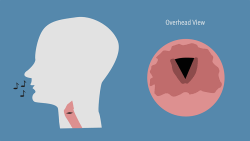Most people have temporarily lost their voice at some point due to laryngitis – a throat infection – or from too much screaming at events such as football games or concerts.
But for millions of people worldwide, damage to their vocal cords is permanent, according to Nathan Welham, a University of Wisconsin speech-language pathologist.
“Certain congenital problems or scarring or tissue loss following surgery … can cause substantial voice loss that can be very challenging to treat with our current methods,” he said. “These types of voice problems can have a devastating impact” on people’s personal and professional lives.
New research by Welham and his colleagues – documented in the journal Science Translational Medicine – involves growing vocal cord tissue in a laboratory.
To do this, larynx tissue was taken from a cadaver and from four individuals who had had their voice boxes removed for reasons other than cancer. The specialized cells were extracted and coaxed to grow on a three-dimensional collagen scaffold.
After about two weeks, the tissue had grown enough to implant into the cadavers of dogs. Once transplanted there, the regenerated vocal folds were grown to human size, which is between 15 to 18 millimeters in length and about one millimeter thick, Welham said.
The newly grown tissue was tested by attaching the engineered vocal chords to an artificial windpipe. Researchers then blew humidified air through the larynxes.
The engineered vocal tissue made an unnatural but encouraging sound, according to Welham.
"The voice sounds a little bit like a kazoo, kind of robotic sounding like, ‘Eeeeeee,’ “ he said. “Something like that. So, you would hear that sound and think, 'Gosh, that sounds synthesized or robotic. It doesn't sound so human.' But that's how it should sound in this context."
The new vocal cord tissue doesn't seem to trigger the body's immune response, according to researchers. That creates the possibility of transplanting the new vocal cords into humans.
In addition, the tissue may be naturally protected against attack by the body's immune system. There are some tissues, such as the corneas in the eye, that do not stimulate an immune rejection.
Human trials, however, are years away, Welham said.




